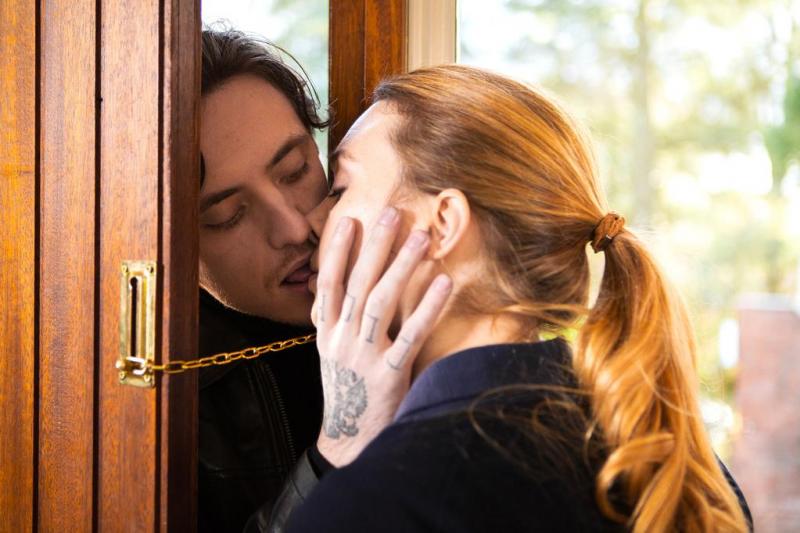Simple Passion review – a case of female amour fou | reviews, news & interviews
Simple Passion review – a case of female amour fou
Simple Passion review – a case of female amour fou
Empathetic drama about a Parisian professor's aching need for her evasive married lover

Pushing 40, Simple Passion’s Hélène (Laetitia Dosch) lectures Paris college students on poetry and is single mother to pre-adolescent Paul (Lou Teymour-Thion).
“Even feminists become submissive when they fall in love,” the manstruck heroine tells her friend Anita (Caroline Ducey), blaming the weakness of her sex for its susceptibility to the darts of virility. Her by no means unique problem is that while Aleksandr has found in her his best sex partner yet, as she has in him, he is unavailable to her on any other level, or for any other activity.
The fourth cinema film written and directed by Lebanon-born, France-based Danielle Ahbid, and the first since 2015’s semi-autobiographical immigrant tale Parisienne (2015), Simple Passion inventively expands on Annie Ernaux’s confessional 1991 novella. The book’s sharp prose not only emphasizes the lacerating humiliation Ernaux incurred in unrequitedly loving a Russian displomat, but also how grievously their 14-month affair subsumed her identity – so entirely her existence had no meaning for her in his absence. On the other hand, Ernaux’s trysts with the unidentified man rejuvenated her desire, enabling her to remake her sexual life. (Simone de Beauvoir’s writings show she was similarly liberated by her more protracted affair with the American writer Nelson Algren.)
Though the film privileges Hélène’s subjectivity and the objectifying female gaze – alert to Aleksandr’s behind, his genitals, and his Michelangelo's "David" torso with its confrontational tattoos – it's as seemingly dismissive of sexual politics as it's determinedly uninterested in the psychological causes of Hélène's self-destructive behaviour. Explicit but unarousing, as visually realistic as most adult French dramas, it’s matter-of-fact about the life-altering significance sex with Aleksandr has for Hélène. Clearly, neither her ex-husband (Gregoire Colin, briefly seen) nor any of her previous lovers have, like Aleksandr, caused her to bask in a post-coital haze, as she does going home on the Metro (pictured below: Laetitia Dosch) – a mirror image of married Connie (Diane Lane) returning from her younger lover’s arms in Manhattan to unsexy suburbia on the Metro-North line in Adrian Lyne’s Unfaithful (2002).
 Simple Passion's most important scene reiterates the traditional generalization that men compartmentalize sex and love whereas women experience them indivisibly. During an especially hectic encounter, Hélène ecstatically tells Aleksandr she loves him, twice – and he disdains to respond. She is heading for a fall.
Simple Passion's most important scene reiterates the traditional generalization that men compartmentalize sex and love whereas women experience them indivisibly. During an especially hectic encounter, Hélène ecstatically tells Aleksandr she loves him, twice – and he disdains to respond. She is heading for a fall.
As Hélène's nervy body language and especially her twingey facial expressions have indicated from the beginning, she’s gone way past the point when she could have escaped the ravages of heartbreak. The thrilling moment-by-moment portrayal of her by the French-Swiss actor (and playwright) Dosch is constructed from the inside out – it’s more being than performing. Whether or not he stretches himself, the Ukrainian ballet superstar Polobin imbues Aleksandr with the right levels of impassivity and suppressed menace. The two smiles Aleksandr grants Hélène – weary, brief, and months apart – are sincere; Polobin pulls those off, too.
Ahbid doesn’t judge Hélène for falling in love with a man some will consider an adulterous jerk, but shows how her erotomaniacal obsession with Aleksandr has made her selfish and an irresponsible mother. When, on one occasion Aleksandr calls to tell her he’s coming by, she shoos Paul off to stay at a friend’s house for the night. After Aleksandr has told her he’ll be gone for months, she buries herself in her bed, alone, amid the mounting squalor of her and Paul's home, but not just for a night. It becomes her chrysalis.
As for Aleksandr, Ahbid doesn’t judge him in the moral context of his and Hélène's relationship. He may be a Putin-era macho man interested only in fast cars and what Hélène considers “Hollywood crap", but he doesn’t lie to or mislead her. In his last scene, he indicates he actually likes her as they tacitly acknowledge they knew what they were getting into. It's a shame the tension created by their feverish pas de deux and the torturous aftermath is dissipated by the awful selection of non-diegetic pop songs added to the soundtrack.
Add comment
The future of Arts Journalism
You can stop theartsdesk.com closing!
We urgently need financing to survive. Our fundraising drive has thus far raised £49,000 but we need to reach £100,000 or we will be forced to close. Please contribute here: https://gofund.me/c3f6033d
And if you can forward this information to anyone who might assist, we’d be grateful.

Subscribe to theartsdesk.com
Thank you for continuing to read our work on theartsdesk.com. For unlimited access to every article in its entirety, including our archive of more than 15,000 pieces, we're asking for £5 per month or £40 per year. We feel it's a very good deal, and hope you do too.
To take a subscription now simply click here.
And if you're looking for that extra gift for a friend or family member, why not treat them to a theartsdesk.com gift subscription?
more Film
 London Film Festival 2025 - a Korean masterclass in black comedy and a Camus classic effectively realised
New films from Park Chan-wook, Gianfranco Rosi, François Ozon, Ildikó Enyedi and more
London Film Festival 2025 - a Korean masterclass in black comedy and a Camus classic effectively realised
New films from Park Chan-wook, Gianfranco Rosi, François Ozon, Ildikó Enyedi and more
 After the Hunt review - muddled #MeToo provocation
Julia Roberts excels despite misfiring drama
After the Hunt review - muddled #MeToo provocation
Julia Roberts excels despite misfiring drama
 Ballad of a Small Player review - Colin Farrell's all in as a gambler down on his luck
Conclave director Edward Berger swaps the Vatican for Asia's sin city
Ballad of a Small Player review - Colin Farrell's all in as a gambler down on his luck
Conclave director Edward Berger swaps the Vatican for Asia's sin city
 London Film Festival 2025 - Bradley Cooper channels John Bishop, the Boss goes to Nebraska, and a French pandemic
... not to mention Kristen Stewart's directing debut and a punchy prison drama
London Film Festival 2025 - Bradley Cooper channels John Bishop, the Boss goes to Nebraska, and a French pandemic
... not to mention Kristen Stewart's directing debut and a punchy prison drama
 London Film Festival 2025 - from paranoia in Brazil and Iran, to light relief in New York and Tuscany
'Jay Kelly' disappoints, 'It Was Just an Accident' doesn't
London Film Festival 2025 - from paranoia in Brazil and Iran, to light relief in New York and Tuscany
'Jay Kelly' disappoints, 'It Was Just an Accident' doesn't
 Iron Ladies review - working-class heroines of the Miners' Strike
Documentary salutes the staunch women who fought Thatcher's pit closures
Iron Ladies review - working-class heroines of the Miners' Strike
Documentary salutes the staunch women who fought Thatcher's pit closures
 Blu-ray: The Man in the White Suit
Ealing Studios' prescient black comedy, as sharp as ever
Blu-ray: The Man in the White Suit
Ealing Studios' prescient black comedy, as sharp as ever
 The Woman in Cabin 10 review - Scandi noir meets Agatha Christie on a superyacht
Reason goes overboard on a seagoing mystery thriller
The Woman in Cabin 10 review - Scandi noir meets Agatha Christie on a superyacht
Reason goes overboard on a seagoing mystery thriller
 London Film Festival 2025 - crime, punishment, pop stars and shrinks
Daniel Craig investigates, Jodie Foster speaks French and Colin Farrell has a gambling habit
London Film Festival 2025 - crime, punishment, pop stars and shrinks
Daniel Craig investigates, Jodie Foster speaks French and Colin Farrell has a gambling habit
 I Swear review - taking stock of Tourette's
A sharp and moving tale of cuss-words and tics
I Swear review - taking stock of Tourette's
A sharp and moving tale of cuss-words and tics
 A House of Dynamite review - the final countdown
Kathryn Bigelow's cautionary tale sets the nuclear clock ticking again
A House of Dynamite review - the final countdown
Kathryn Bigelow's cautionary tale sets the nuclear clock ticking again

Comments
Who is Polobin?